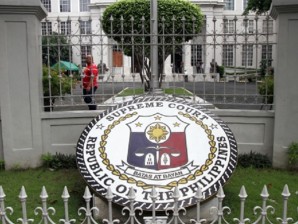No media coverage of massacre trial
MANILA, Philippines—The Supreme Court on Monday ruled that it is prohibiting the live media broadcast of the Maguindanao massacre trial.
In a resolution released Monday, the high court partially granted the motion filed by Andal Ampatuan Jr. who told the high court that in allowing the public trial will deprive him of his rights to due process, equal protection, presumption of innocence, and to be shielded from degrading psychological punishment.
“While this court recognizes the freedom of the press and the right to public information, which by the way are rights that belong to non-direct parties to the case, the rights of the direct parties should not be forgotten. In a clash among these competing interests and in terms of the values the Constitution recognizes, jurisprudence makes it clear that the balance should always be weighed in favour of the accused,” the high court said.
The high court pointed that constitutional rights specific to the accused such as right to due process of law, right to be presumed innocent until proven guilty, right to an impartial and public trial and the requirement of the highest quantum of proof prompted them to take a second look at the high court’s June 2011 decision that allows live media coverage of the trial.
It said the rights of the accused are enough justification that “a camera that broadcasts the proceedings live on television has no place in a criminal trial because of its prejudicial effects on the rights of the accused individuals.”
On June 14, 2011, the high court, through then Associate Justice now Ombudsman Conchita Carpio-Morales allowed the live media coverage of the Maguindanao massacre trial on several conditions: 1. Voice overs are prohibited except on brief annotations of scenes depicted on the trial; 2. Prohibiting repeat audio-visual recording except upon finality of judgment or of brief footage and still images depicted on cartographic sketches of the scenes based on the footage but only for news purposes and 3. It has to be a continuous broadcast with no commercial break except when the trial has adjourned or during break.
Relatives of the victims filed a partial reconsideration on the ruling saying it constitutes prior restraint because it tells the media what to do. They said such a condition would produce a “chilling effect” on all forms of expression about the court proceedings.
Principal accused Andal Ampatuan Jr. also filed a partial motion for reconsideration saying the high court should be more vigilant in safeguarding his rights as an accused.
He argued that the immense publicity and adverse public opinion which the live media coverage can produce would affect everyone including the judge, witnesses for the accused and families of all the parties concerned.
Ampatuan said “live media coverage of the trial is cruel and degrading punishment for the accused even before he is convicted by final judgment.”
In granting Ampatuan’s motion, the high court said the media can still be accommodated during the trial but no live coverage. Instead, it will install closed circuit viewing areas outside the courtroom for those who want to watch the proceedings, similar to what the high court does during oral argument.
The high court will also install closed circuit viewing areas in selected trial courts in Maguindanao, Koronadal, South Cotabato and General Santos City where most relatives of the accused and victims reside.
Recording will be allowed but only for documentary purposes, the high court said. The original audio-visual recording shall be deposited in the National Museum and the Records Management and Archives Office. The camera will be operated only by the Supreme Court.
Aside from the rights of the accused, the high court said the judge and the witnesses must also be protected.
“In this case that has achieved notoriety and sensational status, a greater degree of care is required to safeguard the constitutional rights of the accused. To be in the best position to weigh the conflicting testimonies of the witnesses, the judge must not be affected by any outside force or influence. Like any human being, however, a judge is not immune from the pervasive effects of media,” the high court said.
“A witness’ behaviour and self-consciousness before the camera in a high profile case such as this case might compromise the reliability of the fact-finding process which in turn could skew the judge’s assessment of his or her credibility,” it added.
Originally posted at 10:48 am | Monday, Nov. 12, 2012















